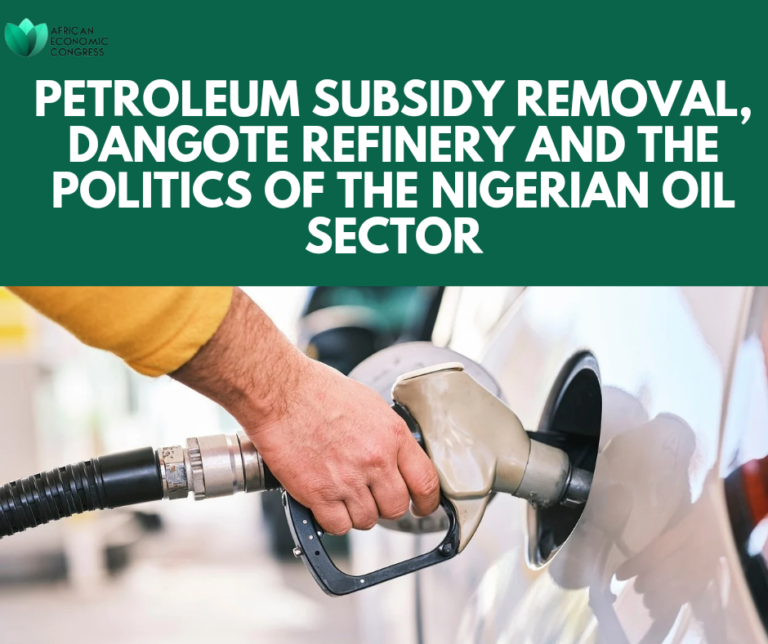- Petroleum Subsidy Removal:
- The fuel subsidy was a long-standing policy that kept fuel prices artificially low for Nigerian consumers
- President Tinubu removed the subsidy in 2023, leading to immediate price increases
- Key impacts include:
- Sharp increase in transportation costs and general inflation
- Reduced strain on government finances
- Push towards market-determined pricing
- Social protests and economic hardship for many Nigerians
- Government promises of palliative measures to cushion effects
- Dangote Refinery:
- Africa’s largest refinery, with 650,000 barrels per day capacity
- Located near Lagos in the Lekki Free Zone
- Represents potential for domestic refining capacity vs historical reliance on imports
- Key points:
- Privately owned rather than state-owned
- Designed to meet Nigeria’s full demand for refined products with excess for export
- Questions about crude oil supply arrangements and pricing mechanisms
- Implications for regional refining dynamics
- Politics of the Nigerian Oil Sector:
- Characterized by complex interplay between:
- Government agencies (NNPC, now NNPC Limited)
- International oil companies
- Local political interests
- Labor unions
- Regional interests (especially Niger Delta)
- Key issues:
- Resource control debates
- Revenue sharing formulas
- Environmental concerns
- Corruption allegations
- Local content requirements
- Pipeline vandalism and oil theft
The interconnections between these three aspects are significant:
- The Dangote Refinery could potentially reduce import dependency that made subsidies so expensive
- Subsidy removal affects the business case for domestic refining
- Political considerations influence both subsidy policies and refinery operations
- Key Power Players and Their Dynamics:
a) Government Institutions:
- NNPC Limited (formerly NNPC): Transformed from a state corporation to a commercial entity
- Ministry of Petroleum Resources
- Department of Petroleum Resources (DPR)
- Key tensions include:
- Overlapping jurisdictions
- Questions about autonomy
- Transparency concerns
- Reform implementation challenges
b) International Oil Companies (IOCs):
- Shell, ExxonMobil, Chevron, Total, etc.
- Notable trends:
- Gradual divestment from onshore assets
- Focus shift to deep offshore operations
- Environmental liability concerns
- Local content compliance issues
- Community relations challenges
- Regional Political Dimensions:
a) Niger Delta Issues:
- Resource control demands
- Environmental degradation
- Revenue sharing disputes
- Militancy and security challenges
- Host community rights
- Implementation challenges of the Petroleum Industry Act (PIA)
b) North-South Dynamics:
- Control of oil institutions
- Revenue allocation debates
- Exploration in frontier basins
- Political appointments in the sector
- Economic and Structural Issues:
a) Oil Revenue Management:
- Federation Account distribution
- Derivation principle debates
- Sovereign Wealth Fund
- Excess Crude Account controversies
b) Industry Structure:
- Downstream sector deregulation
- Pipeline infrastructure
- Transportation networks
- Storage facilities
- Distribution networks
- Corruption and Transparency:
a) Key Challenges:
- Oil theft and pipeline vandalism
- Contract award processes
- Subsidy payment schemes
- Revenue leakages
- Beneficial ownership transparency
- EITI compliance issues
b) Reform Efforts:
- Petroleum Industry Act implementation
- Corporate governance reforms
- Digitalization initiatives
- Anti-corruption measures
- Labor and Employment Politics:
a) Union Influence:
- NUPENG (Nigeria Union of Petroleum and Natural Gas Workers)
- PENGASSAN (Petroleum and Natural Gas Senior Staff Association)
- Impact on sector reforms
- Resistance to privatization
b) Local Content Development:
- Nigerian Content Development and Monitoring Board (NCDMB)
- Indigenous participation requirements
- Capacity building initiatives
- Technology transfer issues
- International Dimensions:
a) OPEC Relations:
- Production quota compliance
- Price stabilization efforts
- International cooperation
- Market share considerations
b) Regional Cooperation:
- West African Gas Pipeline
- Cross-border security
- Regional refining capacity
- Market integration efforts
- Environmental Politics:
a) Key Issues:
- Gas flaring regulations
- Environmental remediation
- Climate change commitments
- Carbon emission reduction
b) Community Relations:
- Social license to operate
- Impact assessments
- Compensation mechanisms
- Development agreements
- Future Challenges and Opportunities:
a) Energy Transition:
- Renewable energy integration
- Gas monetization
- Carbon pricing
- Clean technology adoption
b) Industry Sustainability:
- Investment attraction
- Infrastructure development
- Skill development
- Technology adoption
The politics of Nigeria’s oil sector remains complex and multifaceted, with various stakeholders pursuing different agendas. The successful implementation of reforms often depends on balancing these competing interests while ensuring the sector’s contribution to national development.

